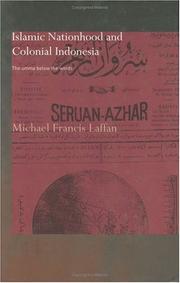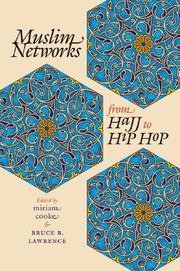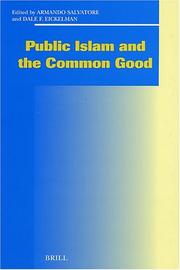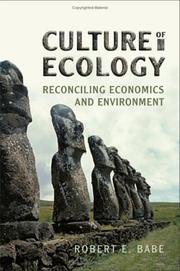| Listing 1 - 8 of 8 |
Sort by
|
Book
ISBN: 9781575063775 1575063778 1575063905 1575063786 9781575063782 9781575063898 9781575063904 1575063891 1646021835 9781646021833 Year: 2015 Volume: 27 Publisher: Winona Lake, Indiana : Eisenbrauns,
Abstract | Keywords | Export | Availability | Bookmark
 Loading...
Loading...Choose an application
- Reference Manager
- EndNote
- RefWorks (Direct export to RefWorks)
The period between the accession of Nabonasser, in 747 B.C.E., and the accession of Nabopolasser, in 625 B.C.E., was a period of significant stability for the city of Babylon, due in large part to the projection of Assyrian power in the region. During this transitional period, increased economic activity throughout Babylonia resulted in an increase in the amount of written evidence. And the legal and administrative texts that have thus far come to light are, in the words of J. A. Brinkman, “a mine of information for researchers interested in demography, social institutions, economic history, and even ancient technology.” In this volume, John Nielsen provides an index of the personal names found on texts from this period. As such, the index is a valuable supplement to the Prosopography of the Neo-Assyrian Empire project (Helsinki). Information presented in the book is modeled on the Helsinki project’s publications. The index includes comprehensive cross-references to the CAD, Stamm’s Namengebung, the Helsinki PNAE indexes, Hölscher’s Personennamen, and Knut Tallqvist’s Neubabylonisch Namenbuch. Nielsen’s prosopographical index adds a major new resource to the study of the Neo-Babylonian period.
Sumerian language --- Umma (Extinct city) --- History --- Harvard Semitic Museum. --- Sumerian language -- Irag -- Umma (Extinct city) -- Texts. --- Umma (Extinct city) -- History -- Sources. --- Yale Babylonian Collection. --- Middle Eastern Languages & Literatures --- Languages & Literatures --- Names, Personal --- Akkadian --- Harvard University. --- Yale University. --- Chokha, Tell (Iraq) --- Djokha (Iraq) --- Jokha, Tell (Iraq) --- Tall Jokha (Iraq) --- Tell Chokha (Iraq) --- Tell Jokha (Iraq) --- Umma (Ancient city) --- Anthroponomy --- Baby names --- Christian names --- Family names --- Forenames --- Names of families --- Names of persons --- Personal names --- Surnames --- Names --- Onomastics --- Akkadian. --- Iraq --- Antiquities --- Akkadian personal names --- Names, Personal - Akkadian --- Sumerian language - Iraq - Umma (Extinct city) - Texts --- Umma (Extinct city) - History - Sources
Book
ISBN: 1920942432 9781920942434 1920942424 Year: 2006 Publisher: Canberra, Australia : ANU E Press,
Abstract | Keywords | Export | Availability | Bookmark
 Loading...
Loading...Choose an application
- Reference Manager
- EndNote
- RefWorks (Direct export to RefWorks)
Ulama --- Community leadership --- Ummah (Islam) --- Community life --- Community power --- Leadership --- Ulema --- Islam --- Muslim scholars --- Umma (Islam) --- Islam and state --- Functionaries --- N.U. (Organization). --- Java (Indonesia) --- Politics and government. --- Djawa (Indonesia) --- Jawa (Indonesia) --- Pulau Jawa (Indonesia) --- Greater Sunda Islands

ISBN: 0415297575 1280402784 0203222571 9780203222577 9781134430819 1134430817 9780415297578 9786610402786 6610402787 9780415444354 0415444357 9781280402784 9781134430772 9781134430826 Year: 2003 Publisher: London New York RoutledgeCurzon
Abstract | Keywords | Export | Availability | Bookmark
 Loading...
Loading...Choose an application
- Reference Manager
- EndNote
- RefWorks (Direct export to RefWorks)
Arguing that Indonesian nationalism rested on Islamic ecumenism, heightened by colonial rule and the pilgrimage, the author contrasts the latter experience with life in Cairo, where some Southeast Asians were drawn to both reformism and nationalism.
Islam and politics --- Nationalism --- Southeast Asians --- Ummah (Islam) --- History. --- Indonesia --- Politics and government --- History --- Islam --- Politics and Islam --- Southeastern Asians --- Umma (Islam) --- Political aspects --- Political science --- Asians --- Ethnology --- Islam and state

ISBN: 0807876313 9780807876312 0807829234 9780807829233 080785588X 9780807855881 9798890879332 Year: 2005 Publisher: Chapel Hill University of North Carolina Press
Abstract | Keywords | Export | Availability | Bookmark
 Loading...
Loading...Choose an application
- Reference Manager
- EndNote
- RefWorks (Direct export to RefWorks)
This volume selects major moments and key players from the seventh century to the twenty-first that have defined Muslim networks as the building blocks for Islamic identity and social cohesion. The essays provide a long view of Muslim networks, correcting both scholarly omission and political sloganeering.
Islam. --- Panislamism. --- Ummah (Islam). --- Social Science. --- Religion. --- Islam --- Panislamism --- Ummah (Islam) --- #SBIB:054.AANKOOP --- #SBIB:316.331H421 --- #SBIB:316.7C130 --- Umma (Islam) --- Islam and state --- Pan-Islamism --- Arabism --- Mohammedanism --- Muhammadanism --- Muslimism --- Mussulmanism --- Religions --- Muslims --- Computer network resources --- Morfologie van de godsdiensten: Islam --- Groepscultuur en subculturen --- Islam - 21st century --- Islam - Computer network resources

ISSN: 13853376 ISBN: 9786610467914 1423711807 9047402820 1280467916 1281458252 9786611458256 9781423711803 9789047402824 9789004136212 9004136215 9004136215 9004156224 9789004156227 6610467919 9781280467912 9781281458254 6611458255 Year: 2004 Volume: 95 Publisher: Leiden; Boston : BRILL,
Abstract | Keywords | Export | Availability | Bookmark
 Loading...
Loading...Choose an application
- Reference Manager
- EndNote
- RefWorks (Direct export to RefWorks)
This book explores the public role of Islam in contemporary world politics. "Public Islam" refers to the diverse invocations and struggles over Islamic ideas and practices that increasingly influence the politics and social life of large parts of the globe. The contributors to this volume show how public Islam articulates competing notions and practices of the common good and a way of envisioning alternative political and religious ideas and realities, reconfiguring established boundaries of civil and social life. Drawing on examples from the late Ottoman Empire, Africa, South Asia, Iran, and the Arab Middle East, this volume facilitates understanding the multiple ways in which the public sphere, a key concept in social thought, can be made transculturally feasible by encompassing the evolution of non-Western societies in which religion plays a vital role.
Islam and civil society. --- Democracy --- Islam and state. --- Ummah (Islam) --- Umma (Islam) --- Islam --- Islam and state --- Mosque and state --- State and Islam --- State, The --- Civil society and Islam --- Civil society --- Religious aspects --- Islam. --- Islamic countries --- Politics and government. --- Democracy - Religious aspects - Islam. --- Islamic countries - Politics and government.

ISBN: 1135885249 1280175133 0203487478 9780203487471 9780415967853 0415967856 0415967856 9781135885199 9781135885236 9781135885243 9780415865081 1135885230 9781280175138 0415865085 Year: 2005 Publisher: New York
Abstract | Keywords | Export | Availability | Bookmark
 Loading...
Loading...Choose an application
- Reference Manager
- EndNote
- RefWorks (Direct export to RefWorks)
This book examines how an elite group of traditionists, historians and theologians shaped Muslims' perceptions of their prophet, their community and their behavior by retelling and interpreting the story of Muhammad's ascent to heaven (the mi'raj).
Islam --- Ummah (Islam) --- Umma (Islam) --- Islam and state --- Origin. --- Muḥammad, --- Mahomed, --- Maḥmūd, --- Mahomet, --- Mohammed, --- Magomet, --- Mu-han-mo-te, --- Nabi Muhammad, --- Mukhammed, --- Maometto, --- Mahometto, --- Mohammad, --- Mahoma, --- Muḥamad, --- מוחמד --- מוחמד, --- ، محمد --- النبي محمد --- محمد --- محمد الرسول --- محمد النبي --- محمد، نبي --- محمد، پيامبر --- محمد، --- محمدو --- محمد, --- محمد. --- ممحمد، --- Isrāʼ and Miʻrāj. --- محمد الرسول, --- محمد النبي,

ISBN: 9780802035868 9780802035950 0802035957 0802035868 9786612014734 1282014730 1442673664 9781442673663 9781282014732 Year: 2008 Volume: 1 Publisher: Toronto : Toronto University Press,
Abstract | Keywords | Export | Availability | Bookmark
 Loading...
Loading...Choose an application
- Reference Manager
- EndNote
- RefWorks (Direct export to RefWorks)
Culture of Ecology marks the beginning in a struggle to prove that, given the right approach, economy and ecosystem need not be mutually exclusive.
Akkadian language --- Cuneiform inscriptions, Akkadian. --- Cuneiform inscriptions, Sumerian. --- Ecology --- Environmental degradation. --- Environmental economics. --- Sumerian language --- Akkadien (Langue) --- Inscriptions cunéiformes akkadiennes. --- Inscriptions cunéiformes sumériennes. --- Sumérien (Langue) --- Economic aspects. --- Lagash (Extinct city) --- Umma (Extinct city) --- Iraq --- Lagash (Ville ancienne) --- Umma (Ville ancienne) --- Irak --- Kings and rulers. --- History --- Rois et souverains. --- Histoire --- Degradation, Environmental --- Destruction, Environmental --- Deterioration, Environmental --- Environmental destruction --- Environmental deterioration --- Natural disasters --- Environmental quality --- Economics --- Ecological economics --- Environmental aspects --- Economic aspects --- #SBIB:316.334.5U34 --- #SBIB:33H13 --- Sociologie van stad en platteland: milieuproblematiek --- Economische politiek --- Cuneiform inscriptions, Akkadian --- Cuneiform inscriptions, Sumerian --- Sumerian cuneiform inscriptions --- Akkadian cuneiform inscriptions --- Hiba, Tall (Iraq) --- Lagash (Ancient city) --- Shirpurla (Extinct city) --- Tall al-Hiba (Iraq) --- Tell al-Hiba (Iraq) --- Rāfidayn, Bilād --- Bilād al-Rāfidayn --- Republic of Iraq --- Jumhuriyah al Iraqiyah --- Chokha, Tell (Iraq) --- Djokha (Iraq) --- Jokha, Tell (Iraq) --- Tall Jokha (Iraq) --- Tell Chokha (Iraq) --- Tell Jokha (Iraq) --- Umma (Ancient city) --- Antiquities --- Inscriptions cunéiformes sumériennes --- Inscriptions cunéiformes akkadiennes --- Sumérien (Langue) --- Texts --- Textes --- Lagash (Vile ancienne) --- Kings and rulers --- Sources --- Rois et souverains --- Environmental economics --- Environmental degradation
Book
ISBN: 9780521732970 9780521514309 0521514304 0521732972 Year: 2014 Publisher: New York Cambridge University Press
Abstract | Keywords | Export | Availability | Bookmark
 Loading...
Loading...Choose an application
- Reference Manager
- EndNote
- RefWorks (Direct export to RefWorks)
"This third edition of Ira M. Lapidus's classic A History of Islamic Societies has been substantially revised to incorporate the insights of new scholarship and updated to include historical developments in the first decade of the twenty-first century. Lapidus's history explores the beginnings and transformations of Islamic civilizations in the Middle East and details Islam's worldwide diffusion to Africa, Spain, Turkey and the Balkans, Central, South and Southeast Asia, and North America, situating Islamic societies within their global, political, and economic contexts. It accounts for the impact of European imperialism on Islamic societies and traces the development of the modern national state system and the simultaneous Islamic revival from the early nineteenth century to the present. This book is essential for readers seeking to understand Muslim peoples."--Publisher information.
Islam --- History --- Islamic countries --- History. --- 905.1 --- 217 --- godsdienst --- geschiedenis --- cultuurgeschiedenis - algemeen --- islam --- World history --- Arab states --- history of Islamic societies --- Islamic civilizations --- The Middle East --- Middle Eastern societies before Islam --- Persian empires --- the Roman Empire --- the Sasanian Empire --- religion and society --- religions and empires --- marriage --- divorce --- sexual morality --- property and inheritance --- seclusion and veiling --- the preaching of Islam --- Arabia --- clans and kingdoms --- Mecca --- language --- the gods --- Muhammad --- state formation --- the Quran --- the Judeo-Christian heritage --- the Arabian heritage --- community and politics --- the Umma of Islam --- the Arab-Muslim imperium --- the Arab-Muslim empires --- the Arab-Muslim conquests --- economic and social change --- Iraq --- Syria and Mesopotamia --- poetry --- Egypt --- Iran --- conversions to Islam --- Arabic --- Middle Eastern languages --- the caliphate to 750 --- the Umayyad monarchy --- the Marwanids --- the 'Abbasids --- the 'Abbasid Empire --- Baghdad --- cosmopolitan Islam --- the Islam of the imperial elite --- religion and identity --- the ideology of imperial Islam --- Islam and iconoclasm --- the caliphate and Islam --- inquisition --- the Arabic humanities --- Persian literature --- Hellenistic literature --- philosophy --- urban Islam --- the Islam of scholars and holy men --- Sunni Islam --- the veneration of the Prophet --- early Muslim theology --- Ash'arism --- scripturalism --- hadith --- tradition and law --- asceticism and mysticism --- Sufism --- Shi'i Islam --- Isma'ili Shi'ism --- Muslim urban societies --- women and family --- non-Muslim minorities --- the early Islamic era --- Islamic legislation for non-Muslims --- Christians and Christianity --- Christian literature in Arabic --- Crusades --- the Egyptian Copts --- Christians in North Africa --- Jews and Judaism --- Egyptian and North African Jews --- the Gheniza era --- the yeshivas and rabbinic Judaism --- the nagid --- Jewish culture in the Islamic context --- continuity and change in the historic cultures of the Middle East --- religion and empire --- the post-'Abbasid Middle Eastern state system --- the Saljuq Empire --- the Mongols --- the Timurids --- Fatimid Egypt --- the Mamluk empire --- the iqta' system and Middle Eastern feudalism --- royal women --- women of urban notable families --- working women and popular culture --- jurisprudence and courts --- Islamic institutions --- mass Islamic society --- Muslim religious movements and the State --- the personal ethic --- normative Islam --- Al-Ghazali --- alternative Islam --- gnostic and popular Sufism --- Islamic philosophy and theosophy --- Ibn al-'Arabi --- the veneration of Saints --- imperial Islamic society --- the limits of worldy life --- state and religion in the Medieval Islamic paradigm --- the global expansion of Islam --- Turkish conquests and conversions --- Anatolia --- the Balkans --- Inner Asia --- India --- Southeast Asia --- sub-Saharan Africa --- Muslim elites --- the reform movement --- Islamic North Africa --- the Zirid empires --- the Banu Hilal --- the Almoravids --- the Almohads --- Islamic religious communities --- Spanish-Islamic civilization --- Hispano-Arabic society --- Hispano-Arabic culture --- the Reconquista --- Muslims under Christian rule --- Judaism in Spain --- Arabic culture --- Hebrew culture --- Latin culture --- convivencia --- the expulsion of Jews from Spain and Portugal --- Jews in North Africa --- the expulsion of Muslims --- Tunisia --- Algeria --- Morocco --- the Marinid and Sa'dian states --- the 'Alawi dynasty --- states and Islam --- Islam in Asia --- the Turkish migrations --- the Ottoman empire --- Turkish-Islamic states in Anatolia --- ghazi state --- the Ottoman world empire --- the janissaries --- Ottoman law --- royal authority --- cultural legitimization --- Ottoman identity --- the Ottoman economy --- Jews and Christians in the Ottoman Empire --- Greek Orthodox and Armenian Christians --- Coptic Christians --- Christians in the Ottoman Near East --- the Ottoman legal system and the family --- freedom and slavery --- family and sexuality --- the postclassical Ottoman empire --- decentralization --- commercialization --- incorporation --- new political institutions --- the Arab provinces under Ottoman rule --- the Safavid Empire --- the reign of Shah 'Abbas --- the conversion of Iran to Shi'ism --- state and religion in the late Safavid Iran --- the dissolution of the Safavid Empire --- the Delhi sultanates --- the Mughal Empire --- the varieties of Indian Islam --- Indian culture --- Aurangzeb --- the international economy and the British Indian Empire --- the Mongol conquests --- Turkestan --- Transoxania --- Khwarizm --- Farghana --- Eastern Turkestan --- China --- Islamic societies in Southeast Asia --- Pre-Islamic Southeast Asia --- Java --- the 'ulama --- the crisis of imperialism and Islam on Java --- Aceh --- Malaya --- Minangkabau --- Islam in Africa --- colonialism --- Islam in Sudanic Africa --- Islam in savannah Africa --- Islam in forest West Africa --- the kingdoms of the Western Sudan --- Mali --- Songhay --- the central Sudan --- Kanem --- Bornu --- Hausaland --- non-state Muslim communities in West Africa --- Zawaya lineages --- the Kunta --- missionaries --- Senegambia --- the West African jihads --- the Senegambian jihads --- 'Uthman don Fodio and the Sokoto Caliphate --- the jihad of al-Hajj 'Umar --- jihad and conversion --- Islam in East Africa and the European colonial empires --- Darfur --- Swahili Islam --- Ethiopia --- Somalia --- Central Africa --- colonialism and the defeat of Muslim expansion --- the Muslim world --- The Mediterranean --- the Indian Ocean --- the rise of Europe and the world economy --- European trade --- naval power --- European imperialism --- modernity --- the transformation of Islamic societies --- Islamic reformism --- Islamic modernism --- nationalism --- the contemporary Islamic revival --- nationalism and Islam in the Middle East --- the modernization of Turkey --- the partition of the Ottoman Empire --- Ottoman reform --- World War I --- Republican Turkey --- the Turkish Republic under Ataturk --- the post-World War II Turkish Republic --- Islam in Turkish politics --- the AKP --- Qajar Iran --- the Pahlavi era --- revolution --- the Islamic Republic --- secularism and Islamic modernity --- British colonial rule --- the Nasser era --- Sadat and Mubarak --- secular opposition movements --- the Arab East --- Arabism --- military states --- the rise of Arab nationalism --- Arabism and Arab states in the colonial period --- Lebanon --- Transjordan and Jordan --- the Palestinian movement and the struggle for Palestine --- Zionism --- the Palestinian movement and Israel --- the Arabian peninsula --- Yemen --- union of the two Yemens --- Saudi Arabia --- political and religious opposition --- foreign policy --- the Gulf States --- Oman --- Kuwait --- Bahrain --- Qatar --- United Arab Emirates --- France --- Algerian resistance --- the Algerian revolution --- independent Algeria --- independent Tunisia --- independent Morocco --- Libya --- Islam in state ideologies and opposition movements --- women in the Middle East --- changes in family law --- women's secular education --- labor and social and political activism --- Post-World War II Arab states --- Islamism and feminism --- Islam and secularism in Central and Southern Asia --- Russia --- the Caucasus --- Tsarist rule --- the jadid movement --- the formation of the Soviet Union --- Soviet modernization --- Post-Soviet Russia --- Azarbayjan --- the Muslims of China --- the Indian subcontinent --- Pakistan --- Afghanistan --- Bangladesh --- the partition of the Indian subcontinent --- Muslim militance --- Plassey --- the Pakistan movement --- the Muslims of post-Partition India --- Indonesia --- Malaysia --- the Philippines --- Dutch rule and economic development in the Indies --- Southeast Asian responses to Dutch rule --- Islamic traditionalism --- the priyayi --- the merchant elites --- Islamic and secular nationalist political parties --- the Indonesian Republic --- Sukarno --- a secular Indonesia --- the Suharto regime --- Indonesian Islam --- British Malaysia and independent Malaysia --- the Malaysian state and Islam in a multiethnic society --- Mauritania --- Senegal --- Nigeria --- military rule --- civil war --- Eritrea --- Swahili East Africa --- Zanzibar --- Tanzania --- Kenya --- Uganda --- universal Islam and African diversity --- Islam in the West --- the United States --- American converts --- Muslim identity issues in the United States --- Canada --- Eastern Europe --- Bosnia and Yugoslavia --- Albania --- Bulgaria --- Western Europe --- immigrant identities in Europe --- immigrant status --- Britain --- Germany --- Sweden --- Netherlands --- the anti-immigrant reaction --- secularized Islam --- Islamic revival --- pre-modern Islamic societies --- religious revival --- transnational Islam --- Islamism and political action --- the relations between states and Islamic societies --- Islamic and neo-Islamic states --- secularized states with Islamic identities --- secularized states and Islamic opposition --- Islamic national societies in Southeast Asia --- Muslims as political minorities
| Listing 1 - 8 of 8 |
Sort by
|

 Search
Search Feedback
Feedback About
About Help
Help News
News